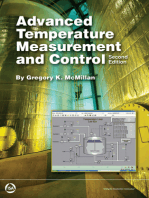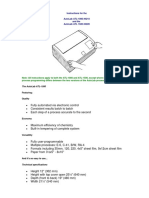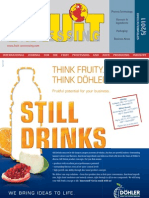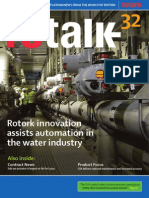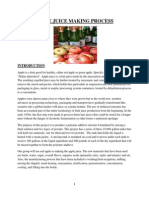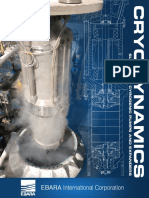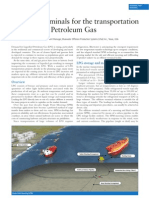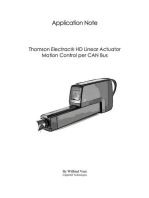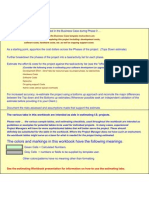Orange Sky e
Orange Sky e
Uploaded by
lavsa1Copyright:
Available Formats
Orange Sky e
Orange Sky e
Uploaded by
lavsa1Original Description:
Copyright
Available Formats
Share this document
Did you find this document useful?
Is this content inappropriate?
Copyright:
Available Formats
Orange Sky e
Orange Sky e
Uploaded by
lavsa1Copyright:
Available Formats
7
Freshly pressed orange juice from Brazil on the way to North America and Europe
Orange Sky Successful Teamwork
The Orange Sky is one of the rst ships transporting juice directly from the orange in a liquid state. Getting the ship t for this task was not only a technical challenge it was also dependent on an excellently functioning international management of the parties involved in the equipping Brazilian juice producer, Atlanship Ship Management Company, Lloyd Werft, Bremerhaven and Siemens.
motion world 1/2003
CASE STUDY
Global Player in Food and Beverage Industry
Whether nectar, orange juice drink or pure orange juice most orange juices you will nd in supermarkets are made of concentrate diluted with ltered water. A new term has recently been added to the range of orange juice products: NFC (not from concentrate). Directly pressed and lled printed on the pack, this indicates that the juice comes exclusively from the fruit, e.g. from oranges, and is not made from concentrate and is therefore an NFC drink. The largest quantities of NFC juices come from Florida and Brazil. There it is manufactured and exported all over the world by large companies. One of these companies is the Brazilian outt Cutrale. With more than 30 million trees, Cutrale is the worlds largest producer of citrus fruits. After the harvest, the citrus fruits
are processed in plants similar to reneries as concentrate or NFC. In the production of NFC the juice and the pulp are separated during pressing. The pulpless juice is then usually rst heated and then deep frozen as a preservative and nally loaded in a frozen state in refrigerator holds for shipping all over the world.
As good as freshly pressed ...
... frozen juice isnt according to consumer opinion. Thats understandable because its quite probable that pulp from Florida is mixed with juice from Brazil during thawing. To meet the demand for even more genuine freshly pressed orange juice, Cutrale has decided to transport liquid orange juice on appropriately converted ships and to store it at suitable tank farms.
Cutrale, Brazil is the worlds biggest producer of citrus fruits
Zefa
Process automation on the Orange Sky
Two things are very important for transporting or storing fresh Links is also involved and integrates various motor switches and orange juice in the high-grade steel tanks. For one thing, the juice valves in the overall system. must be kept at an exactly dened low temperature. For another, the tank must be absolutely germ-free and may therefore have no contact at all with air or oxygen. This is guaranteed by TCP/IP blowing in nitrogen (N2). Both the temperature and the N2 pressure must be Redundant measured continuously (every second) and WinCC server regulated. An hourly report is printed automatically. Industrial Ethernet Cooling, pressure and temperature regulation and lling level measurement all take Control system place fully automatically. Every tank is tted with a Siemens Miltronics radar lling level meter, two Siemens pressure Simatic PCS 7 OLM transmitters (for measuring the lling level by the static pressure and measurement of Field instruments Field devices (pressure, temperature, DP/PA link the N2 pressure), a Siemens temperature flow measurement) transmitter and several ow meters, position controllers and switches. Profibus PA A Simatic PCS 7 process control system is OLM AS-I Network used. The communication between the DP/AS-i-link control system, cooling system control AS-i valves AS-I interface modules (Simatic S7-300) and the SCADA system (two redundant Simatic WinCC servers) is Drives taken care of by Industrial Ethernet. The OLM link to the rest of the periphery as well as Micromaster various drive systems (Micromaster) is made via Probus DP (partly in the optical Micromaster version), the link to the process instrumentation via Probus PA. The AS-Interface bus system connected to Probus via DP/AS-IProfibus DP fiber optic
The freighter May Oldendorff set out on its maiden voyage three years ago. In August 2001 the owners, Adriatic Reefer Corp. Inc., La Tour-de-Peilz, Switzerland (Management: Atlanship S.A., La Tour-dePeilz), bought the ship and converted it into a juice tanker which rst went into service in October 2002, now renamed Orange Sky. Ever since, the Orange Sky has been carrying the valuable juice from Santos, the So Paulo harbor, to the United States (Florida and New York) and in future will also be sailing to Europe (Rotterdam). The ship which still sails under Liberian ag (approx. 172 meters long, 27 meters wide and a draught of 9.7 meters) reaches a maximum speed of almost 15 knots with a performance of 9600 hp. Four of the 15 tanks are lled with liquid orange juice at the moment. The rest of the holds still contain deep frozen juice. To turn the freighter which used to carry grain into a tanker, a complete overhaul of the electrical installations was necessary in addition to the reconstruction. The conversion itself was done by Lloyds at their shipyard in Bremerhaven. Lloyds contracted Siemens Industrial Services Germany to plan, install and commission the electrical installations. To avoid expensive pasteurization processes, the juice must be stored in absolutely germ-free tanks. These must not only
be pre-cooled but must also be kept at a dened atmospheric pressure and temperature. Such a sensitive process requires an appropriately sophisticated process automation. The contract for the process automation on board the Orange Sky was awarded to the Process Solution Division of Siemens Energy & Automation (SE&A) in St. Louis in the United States (whereby the contracting company was not the Bremerhaven shipyard but the Swiss shipping company). SE&A had already provided the process automation for another tank farm for fresh orange juice in Newark. Apart from the American engineers, the experts for process instrumentation in Karlsruhe (see inset for technical details) were also involved. The general management for the process automation project was in the hands of Ingo Magura from SE&A, St. Louis.
tomers from different countries with different relationships to each other are involved, Corporate Account Manager Steve Appleton conrms. The function of a Corporate Account Manager as a stringpuller on the Siemens side has certainly paid off. The CAM knows the customers, opens their doors and can best judge who should or must be involved within the company. He can also give the customer or customers a general idea of the competencies and possibilities on site.
Global player with high efficiency
Siemens signicant involvement in the retrotting of the Orange Sky with these two projects electrical installation and process automation was not only due to their suitable, wide range of products and services, worldwide presence and their experience as a highly efficient global player also played an extremely important role. Certainly all the more so where as in the project described here different cus-
More information: www.siemens.de/???
motion world 1/2003
Peter Bichsel
The Orange Sky, the worlds rst fresh juice tanker
You might also like
- L200 ECU (Pin-Out) Motores Familia 4N15Document1 pageL200 ECU (Pin-Out) Motores Familia 4N15Roberto Ortega Micalizzi100% (5)
- Higher Diploma in Network Technology & Cyber Security - ICBT CampusDocument3 pagesHigher Diploma in Network Technology & Cyber Security - ICBT Campus8f5hsvxw4q100% (1)
- Compass Ocbservation Book (Gyro Error)Document4 pagesCompass Ocbservation Book (Gyro Error)lavsa175% (4)
- Advanced Temperature Measurement and Control, Second EditionFrom EverandAdvanced Temperature Measurement and Control, Second EditionNo ratings yet
- Virgin Water-1Document36 pagesVirgin Water-1Deepak PathaniaNo ratings yet
- It ReportDocument24 pagesIt ReportTobenna Alan Ndu0% (1)
- Instructions For The Autolab Atl-1000 #4210 and The Autolab Atl 1500 #4228Document35 pagesInstructions For The Autolab Atl-1000 #4210 and The Autolab Atl 1500 #4228Carlos F Ramírez M.No ratings yet
- PLC Bottle LabelDocument12 pagesPLC Bottle LabelVinod Kumbhar100% (1)
- SRS School Management SysDocument49 pagesSRS School Management Sysshahroz AhmadNo ratings yet
- Tuto NX12Document31 pagesTuto NX12tsaipeterNo ratings yet
- Fruit 5 2011Document54 pagesFruit 5 2011travelpanz100% (1)
- Improving Efficiency of Sealing Water SystemsDocument11 pagesImproving Efficiency of Sealing Water SystemsRudy WijayaNo ratings yet
- Aquatherm Blue Pipe PDFDocument164 pagesAquatherm Blue Pipe PDFAnonymous 4MwmDaNbNo ratings yet
- Plunger Lift FINALDocument4 pagesPlunger Lift FINALNazeeh Abdulrhman AlbokaryNo ratings yet
- Tank Control Systems Land Application Brochure2011Document12 pagesTank Control Systems Land Application Brochure2011_commandos_No ratings yet
- Level Filler enDocument36 pagesLevel Filler enDdt WahyudiNo ratings yet
- Otc 24297 MsDocument13 pagesOtc 24297 MsTamires SoaresNo ratings yet
- Aquamaof+ SubflexDocument14 pagesAquamaof+ SubflexIsrael ExporterNo ratings yet
- Literature Review Water Level IndicatorDocument8 pagesLiterature Review Water Level Indicatorea3c5mfq100% (1)
- FRAMO Subm Cargo PumpDocument5 pagesFRAMO Subm Cargo PumpCvita CvitićNo ratings yet
- Rotork Innovation Assists Automation in The Water Industry: Also InsideDocument20 pagesRotork Innovation Assists Automation in The Water Industry: Also InsideIñaki EseberriNo ratings yet
- Beckhoff - Waster and Clean Water Process Solution r4Document32 pagesBeckhoff - Waster and Clean Water Process Solution r4Romi AntonNo ratings yet
- Reefer GuideDocument46 pagesReefer GuideJuan Carlos Ibarguen100% (2)
- Wo Whts NW in Articial LFT PDocument2 pagesWo Whts NW in Articial LFT PPedro Paulo CordeiroNo ratings yet
- Apple Juice Making ProcessDocument33 pagesApple Juice Making ProcessCt Hajar71% (14)
- 1 - Bottled Uht Milk and Dairy Drinks - UsDocument6 pages1 - Bottled Uht Milk and Dairy Drinks - UswisokresnoNo ratings yet
- Broucher DataDocument22 pagesBroucher Datarohan khariwaleNo ratings yet
- Presentation HapagLloyd Reefer High ValueDocument24 pagesPresentation HapagLloyd Reefer High ValuealbertbhluiNo ratings yet
- Temperature and Pressure Measurement: State of Technology 2017Document24 pagesTemperature and Pressure Measurement: State of Technology 2017Vignesh RajanNo ratings yet
- Modern Pumping TodayDocument76 pagesModern Pumping Todayanjangandak2932No ratings yet
- Marintec China 2013Document74 pagesMarintec China 2013binh_duyvuNo ratings yet
- PumpsDocument9 pagesPumpsMohamed TallyNo ratings yet
- LNG Regasification StationDocument2 pagesLNG Regasification Stationjordy745No ratings yet
- Hydrology - Prod Range - 3Document8 pagesHydrology - Prod Range - 3M Nur SalimNo ratings yet
- Accuri C6 Plus Training - 2019Document4 pagesAccuri C6 Plus Training - 2019jjohn66988No ratings yet
- Carlsberg Takes The Bottleneck Out of BottlingDocument2 pagesCarlsberg Takes The Bottleneck Out of BottlingManu TiwariNo ratings yet
- RDM FJ Need Case Study v22Document2 pagesRDM FJ Need Case Study v22navindranNo ratings yet
- Marine EssentialDocument92 pagesMarine Essentialbillyboxer100% (1)
- Aermec Viticoltura Eccellenza enDocument48 pagesAermec Viticoltura Eccellenza enCvijetinTodorovicNo ratings yet
- Ebara Cryo BrochureDocument20 pagesEbara Cryo BrochuremishraenggNo ratings yet
- How To Cure 7 Common Tank Gauging HeadachesDocument12 pagesHow To Cure 7 Common Tank Gauging Headachesabs0001No ratings yet
- Chemical Engineering 12 2012Document70 pagesChemical Engineering 12 2012Leonardo Ramos100% (1)
- Cooling Water System - PIPENETDocument2 pagesCooling Water System - PIPENETekabudiartiNo ratings yet
- Incheon Regas PDFDocument11 pagesIncheon Regas PDFdhanta_1412No ratings yet
- Packaged Air Separation PlantsDocument12 pagesPackaged Air Separation PlantsSrinivas VemulapalliNo ratings yet
- Gefico Brochure +UFDocument40 pagesGefico Brochure +UF1zorro10% (1)
- Cip 200-3SDocument21 pagesCip 200-3SgrNo ratings yet
- Automatic Liquid Filling To Bottles of Different HeightDocument3 pagesAutomatic Liquid Filling To Bottles of Different HeightJeeva MJNo ratings yet
- 456e Ice Cream PasteurizerDocument8 pages456e Ice Cream PasteurizerZoran DanilovNo ratings yet
- Cty TNHH Ta Ha - VietNamDocument4 pagesCty TNHH Ta Ha - VietNamhoabien82No ratings yet
- QuantityWare Quantity Data Flow BCPDocument16 pagesQuantityWare Quantity Data Flow BCPspsuman05No ratings yet
- DVI143 Neatpump EN 1209 PDFDocument4 pagesDVI143 Neatpump EN 1209 PDFHamza BaraketNo ratings yet
- OTC 20993 AKPO: The Subsea Production SystemDocument17 pagesOTC 20993 AKPO: The Subsea Production SystemRasheed YusufNo ratings yet
- Offshore Terminals For The Transportation of Liquefied Petroleum GasDocument3 pagesOffshore Terminals For The Transportation of Liquefied Petroleum GasPavithra Anandan100% (3)
- RolleChim SRL Presentation 2015Document10 pagesRolleChim SRL Presentation 2015Gargiulo AnitaNo ratings yet
- Ministry of Education West Yangon Technological University Department of Electronic EngineeringDocument9 pagesMinistry of Education West Yangon Technological University Department of Electronic EngineeringKg Myat HtutNo ratings yet
- Plate FreezersDocument4 pagesPlate FreezersSushant PatilNo ratings yet
- P06e Destillationstechnik 09Document16 pagesP06e Destillationstechnik 09Nurul AniraNo ratings yet
- Marine Diesel Engine ThesisDocument6 pagesMarine Diesel Engine Thesisfc5wsq30100% (1)
- E40000 Aquatherm Red Pipe 02Document74 pagesE40000 Aquatherm Red Pipe 02Akram FerchichiNo ratings yet
- Career as an Air Conditioning TechnicanFrom EverandCareer as an Air Conditioning TechnicanRating: 5 out of 5 stars5/5 (2)
- Thomson Electrac HD Linear Actuator Motion Control per CAN BusFrom EverandThomson Electrac HD Linear Actuator Motion Control per CAN BusNo ratings yet
- City of Paris and City of Rome - VESSEL DETAILSDocument1 pageCity of Paris and City of Rome - VESSEL DETAILSlavsa1No ratings yet
- 11 BillofLading Types 000Document5 pages11 BillofLading Types 000lavsa1No ratings yet
- ETD 6/15/2003 18:00 Dist 4076 Speed 20.50 Zone 6.00 0.25: Day/Month/ Year TimeDocument5 pagesETD 6/15/2003 18:00 Dist 4076 Speed 20.50 Zone 6.00 0.25: Day/Month/ Year Timelavsa1No ratings yet
- Spool Generated For Class of Oracle by Satish K YellankiDocument0 pagesSpool Generated For Class of Oracle by Satish K YellankiDharmendra K BhogireddyNo ratings yet
- Tr111stud Maximo ManualDocument696 pagesTr111stud Maximo Manualdjamaani kawiNo ratings yet
- FALLSEM2022-23 MCSE502L TH VL2022230106912 2022-11-24 Reference-Material-IDocument18 pagesFALLSEM2022-23 MCSE502L TH VL2022230106912 2022-11-24 Reference-Material-IrammohansuccessNo ratings yet
- OPTOCOUPLER 817cDocument7 pagesOPTOCOUPLER 817cJose Luis MamaniNo ratings yet
- B.tech (Computer Science) 6th Sem Syallabus MDUDocument12 pagesB.tech (Computer Science) 6th Sem Syallabus MDUakhil17krNo ratings yet
- Intuition vs. Data-Driven Decision Making: Prospect Research & EthicsDocument38 pagesIntuition vs. Data-Driven Decision Making: Prospect Research & Ethicsapi-25953150No ratings yet
- Learning Style - Lesson 1Document18 pagesLearning Style - Lesson 1Nic Hussin Mejia100% (2)
- Bca 7th 8th Semester SyllabusDocument50 pagesBca 7th 8th Semester SyllabusMagneto Eric Apollyon ThornNo ratings yet
- Operational ResearchDocument2 pagesOperational ResearchKeerthiga Chandrasekar100% (4)
- A Complete Beginner's Guide To DjangoDocument279 pagesA Complete Beginner's Guide To DjangoDaniel dos SantosNo ratings yet
- Complete Guide To Black and White PhotographyDocument1 pageComplete Guide To Black and White Photographygreenspa731No ratings yet
- Tj1650ms5a en PDFDocument4 pagesTj1650ms5a en PDFMin MyatNo ratings yet
- Reformulated Chatbot Framework: 1. Account ManagementDocument2 pagesReformulated Chatbot Framework: 1. Account Managementakash paulNo ratings yet
- Water Level Monitoring For FishpondDocument23 pagesWater Level Monitoring For FishpondJake D La Madrid100% (3)
- Example Program Based On Java Loop StatementDocument14 pagesExample Program Based On Java Loop StatementAmol AdhangaleNo ratings yet
- Analysis of Attribute Relevance in Data Mining - GeeksforGeeksDocument2 pagesAnalysis of Attribute Relevance in Data Mining - GeeksforGeeksRavindra Kumar PrajapatiNo ratings yet
- Mi20 Bee Eye Vision Manual (Version 9.9.7.0)Document198 pagesMi20 Bee Eye Vision Manual (Version 9.9.7.0)Mohd Nurfirdaus Mohd ShamsuriNo ratings yet
- The AMA Handbook of Project Management, 2nd Edition (2006) - DDUDocument519 pagesThe AMA Handbook of Project Management, 2nd Edition (2006) - DDUaaliyah_shan123100% (11)
- QDPDocument94 pagesQDPtrestresbizarreNo ratings yet
- How To Build Your Own Custom ChatGPT Bot With Custom Knowledge Base - Better ProgrammingDocument8 pagesHow To Build Your Own Custom ChatGPT Bot With Custom Knowledge Base - Better ProgrammingJanvier SabatèsNo ratings yet
- Chapter 13 Building Information Systems: Management Information Systems: Managing The Digital Firm, 16e (Laudon)Document5 pagesChapter 13 Building Information Systems: Management Information Systems: Managing The Digital Firm, 16e (Laudon)Alfina Ludia Putri0% (1)
- AirLive WMU-6500FS SpecsDocument3 pagesAirLive WMU-6500FS SpecsFikri MuhammadNo ratings yet
- Estimating TemplateDocument14 pagesEstimating TemplateRamelfebea Montedelobenia100% (1)
- PTM Falcon 10 100Document678 pagesPTM Falcon 10 100Fidel Arellano100% (3)
- SF20D600D2: 600V, 20A Ultrafast Dual RectifiersDocument5 pagesSF20D600D2: 600V, 20A Ultrafast Dual RectifiersNestor TorresNo ratings yet
- Azure Proof of Concept Guide For DevelopersDocument54 pagesAzure Proof of Concept Guide For DevelopersAxel Kruse100% (3)



